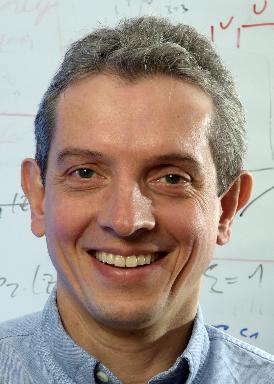| Prof. Wolfram Burgard "Reliable Life-long Navigation for Mobile Robots" |
Over the last years, there has been a tremendous progress in the area of mobile robot navigation. Robots are able to build large- scale maps of their environments and to use these maps for navigation.
However, the final step towards fully autonomous robots in real-world scenarios and industrial applications has not entirely been taken. In this presentation, I will describe some state-of-the-art techniques for robot navigation, potentials, and open research questions for taking the leap towards truly autonomous robots operating over long periods of time in complex and dynamic application scenarios.
|
 |
Wolfram Burgard studied Computer Science at the University of Dortmund and received his Diploma Degree in 1987. In 1990, he became a member of the University of Bonn where he got his Ph.D.~in 1991. From
1991 to 1999 Wolfram Burgard was a PostDoc at the University of Bonn. Since 1999, Wolfram Burgard is a professor at the University of Freiburg where he heads the Laboratory for Autonomous Intelligent Systems (AIS). His major research interests include mobile robotics, state estimation and control, and artificial intelligence. In his career, Wolfram Burgard has published two books and over 200 papers and articles in outstanding journals and conference proceedings.
|
For his scientific contributions he has received eight best paper awards from major conferences including the IEEE International Conference on Robotics and Automation (ICRA), IEEE International Conference on Intelligent Robots and Systems (IROS), and the National Conference on Artificial Intelligence (AAAI). Wolfram Burgard is an active member of the IEEE Robotics and Automation Society as well as a life-time member of the American Association of Artificial Intelligence (AAAI). He is Fellow of the European Coordination Committee for Artificial Intelligence (ECCAI) and the Association for the Advancement of Artificial Intelligence (AAAI). In 2009, Wolfram Burgard received the Gottfried Wilhelm Leibniz Prize of the German Research Foundation (DFG), the most prestigious German research award. For more information see: http://www.informatik.uni-freiburg.de/~burgard/
|
| Prof. Peter Flach "Machine Learning: Unity in Diversity" |
The last decade has seen the range of AI applications in everyday computing grow at an unprecedented rate. Necessitated by the ever-increasing volume of digital data, many of these applications involve some form of machine learning. That principles of machine learning are entering the computer science curriculum seems therefore entirely justifiable. Nevertheless, the field can appear impenetrable to a novice due to a bewildering diversity of possible methods and approaches. The aim of this talk is to emphasise the unifying elements in this diversity. Most of these elements have always been there but were perhaps not given the place they deserve. For instance, every machine learning model is built from features, yet features are typically taken for granted and discussed only in passing, if at all. I will also propose a novel and pragmatic distinction between splitting models and grading models, which offers several advantages over more common but ultimately somewhat arbitrary oppositions such as Bayesian, instance-based, rule-based, and the like.
|
 |
Peter Flach leads the Machine Learning and Biological Computation research group at the Department of Computer Science at the University of Bristol. He started his research career at Philips Research Laboratories, was an Assistant Professor at the University of Tilburg, and moved to Bristol in 1997, where he was promoted to a personal Chair in Artificial Intelligence in August 2003.
Professor Flach was Principal Investigator on several EU-funded projects on Inductive Logic Programming, Data mining and decision support.
He was associate editor of Machine Learning from 2001-2005, and is on the editorial boards of Machine Learning, Journal of Machine Learning Research, Journal of Artificial Intelligence Research, Artificial Intelligence Communications, and Theory and Practice of Logic Programming.
|
He was invited speaker at eight international conferences and workshops, most recently at the 2007 European Conference on Machine Learning. Among many different other conferences, he is the Programme Co-Chair of the 2009 ACM Conference on Knowledge Discovery and Data Mining, when it comes to Europe (Paris) for the first time.
Professor Flach publishes widely and on a broad range of subjects. He is an internationally leading researcher in the areas of mining highly structured data and the evaluation and improvement of machine learning models using ROC analysis.
He has also published on the logic and philosophy of machine learning, and on the combination of logic and probability. His most recent research concerns annotation, integration and mining of large volumes of scientific data. For more information see: http://www.cs.bris.ac.uk/~flach/
|
Industry talk | | Peter van der Putten"AI in the Wild: Decisioning, Predictive Analytics and Simulation for Customer Experience Optimization" | 
|
|
|
To put it mildly, the field of marketing doesn't always have a positive image with the general public. To a large extent companies themselves are to blame because of bombarding random customers with untargeted, irrelevant and untimely sales messages. Companies are starting to realize that they are better off if they balance business priorities with actual customer needs at an individual customer level, and that interactions that the customer initiates are perhaps a better moment in time to make real time recommendations on how to get more value out of the company, leading to an improved customer experience. More visionary marketeers are using rule and machine learning based technologies such as real time predictive data mining and decisioning on a massive scale to enable this. In this talk I would like to give a peak behind the scenes and provide real world examples of the extent and type of use and what some the challenges are when deploying these technologies out of the lab, into the wild.
|
Peter van der Putten is Worldwide Director Decisioning Solutions at Chordiant in Amsterdam, and a guest researcher at LIACS Leiden University.
For more information see: http://www.linkedin.com/in/pvdputten
|